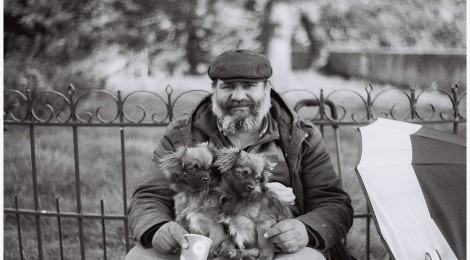
At CAMH, Pet Therapy Helps Decrease Stigma of Severe Mental Illness
When I tell others that I volunteer with my dog in a pet therapy program, they assume my work involves children or the elderly. I am not surprised: the benefits of animal-assisted therapy for these groups are widely known.
But my dog Rambo’s “patients” are quite different. He and I volunteer at an inpatient unit at the Centre for Addiction and Mental Health (CAMH) in Toronto. The people Rambo sees every Tuesday reside in the Secure Forensic Unit.
Accused of committing crimes ranging from shoplifting to homicide, these individuals all suffer from severe mental illness. Their treatment at CAMH is court-ordered, and they are routinely assessed by mental health professionals to determine if they can be held responsible for their crimes.
Theresa Conforti, the co-ordinator for Clinical Programs and Volunteer Resources at CAMH, explains how pets factor into the equation:
“For the past 10 years, CAMH has had their own Pet Therapy Program that is very unique and caters only to the clients at CAMH. The clients value the unconditional love and affection the dog gives them on a weekly basis. The importance is that this program bridges the gap for those who have had to leave their furry friends to come to treatment, and for those who will not be able to own a dog due to financial restrictions or housing situations. The weekly visits ease loneliness, improve communication, foster trust, decrease stress and anxiety, and are a lot of fun!”

The program assesses the volunteers for eligibility, while the dog goes through an evaluation with a professional service dog trainer. Conforti notes:
“This works because those interested in volunteering at CAMH are not here to stigmatize our patients, rather they are here to make a difference and di-stigmatize mental illness.”
To say the experience has been rewarding for volunteers like me would be an understatement. Patients are happy to see Rambo, talk to him, pet him, or just be in the same room with him. Not only does he give them a break from their daily routines and the confinement of their unit at CAMH, but he also offers unconditional affection to those in the program.
And while the benefits of pet therapy are numerous, unconditional affection is the critical point here.
When people find out where Rambo and I volunteer, I am often asked whether I fear for our safety, highlighting the common misconception that individuals with severe mental illness are dangerous and violent. Stereotypes like this further perpetuate mental illness stigmatization.
But animals do not judge. They do not care about physical appearance, diagnoses, or criminal history. Conforti recalls:
“One of our dogs went on a unit and a selective mute client—a client who chooses not to speak—had knelt down and whispered in the dog’s ear. No one heard what the client said to the dog, but it was the first time the client had ever spoken. And he had chosen to do so to a dog that will not judge nor will expect much from him. I love that story because it shows that dogs are there to help, love unconditionally, and, most importantly, they do not stigmatize.”
This may be one reason animal-assisted therapy programs are gaining popularity globally. A program in Bollate, Italy, has introduced the use of dog therapy for prison inmates. Valeria Gallinotti, the founder of the program, explains:
“My dream was to organize pet therapy sessions in prison because it’s the one place where there is a total lack of affection, where dogs can create calm, good moods, emotional bonds and physical contact.”
The program has been a hit with inmates, who look forward to the dogs’ visits and have formed a sense of close companionship with them. When asked who his favourite dog was, one of the inmates said:
“Carmela arrived and didn’t know what to do. She was so scared, sort of like us when we arrive in prison. Now, like us, she too is getting used to the experience.”
Whether part of psychotherapy, physiotherapy, or a prison inmate program, animal assisted therapy can give people the extra motivation needed to get through the challenge of treatment or confinement. Patients and clinicians alike have a lot to gain from therapists like Rambo.
–Essi Numminen, Contributing writer
Photo/Video Credits:
Feature: Ryan Faist
First: Essi Numminen
Second: CAMH



